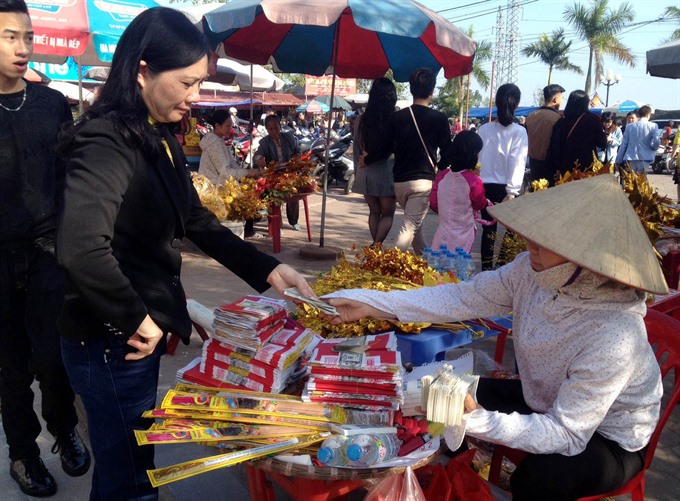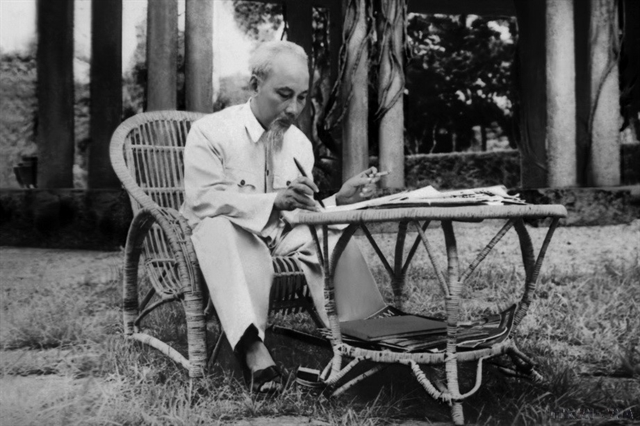 Society
Society

The demand for small demination notes to be given as “lucky money” soars as the Tết (Lunar New Year) approach.
 |
| People exchange high denomination notes for smaller ones in front of the Trần Temple in Nam Định Province. The demand for small notes, mostly given to children as "lucky money;" and as cash offerings in pagodas and temples during the New Year holidays, has made the money exchange service quite popular. -- VNA/VNS Photo Văn Đạt |
HÀ NỘI – You want to change VND100,000 into smaller denominations, so you pay VND150,000, a 150 per cent commission or “service charge.”
This strange phenomenon becomes almost normal at this time of the year, as the demand for “lucky money” increases.
The demand for small denomination notes to be given as “lucky money” soars as Tết (Lunar New Year) approaches, and with it, the likelihood of excessive commissions for getting them.
The money exchange service offered in the capital city, on typical streets like Nguyễn Xí and Hà Trung, has already begun to bustle.
The service providers maintain this informal market meets real demand among people for new small denomination notes.
They also say that the smaller the denomination, the higher the “service charge.” The smaller denominations range from VNĐ500 to VNĐ20,000.
The word on the street is that the charges are higher than last year.
"The lowest fee is between four and five per cent for VND50,000 notes, but it may reach 70-80 per cent with VNĐ500,” a currency shop owner on Hà Trung Street told an online newspaper.
In order to exchange VNĐ1 million ($44) for VNĐ10,000 notes, customers would have to pay between VNĐ100,000 and 120,000; or VNĐ160,000-200,000 for VNĐ2 million ($88) of VNĐ20,000 notes, she said. She claimed that it might cost nearly VNĐ800,000 (US$35) to get VNĐ1 million of VNĐ500 notes.
Many online websites are now offering the same service with service charges ranging from 5 to 12 per cent depending on the denomination.
Due to high demand, the charge for VNĐ500 denomination is up to VNĐ150 per cent in some cases, it is reported
The money exchange service is provided by shops offering items of worship near big pagodas all year round.
The popular practice of giving lucky money to children during the Lunar New Year holiday and of making offerings at pagodas has made the service quite popular.
Nguyễn Thị Trúc, a resident of Hà Nội’s Đống Đa District, said her family often went to the pagodas on the first days of the New Year, so she has started buying new banknotes weeks before Tết.
“Over the past few years, there has been a short supply of new, small notes as the central bank has not printed notes of denominations under VNĐ5,000; but they are always available at shops near pagodas,” she said.
She herself makes her purchases at a currency shop on Hà Trưng Street, Truch said.
The note exchange service has also begun bustling in HCM City, with little more than a one month to go before Tết.
Many people have started visiting currency exchange shops on Sư Vạn Hạnh Street in District 10 or Nguyễn Oanh in Gò Vấp District to buy new notes.
Here too, the lowest fee is 4-5 per cent for VNĐ50,000 notes and 70-80 per cent for VNĐ500 notes. These charges will get even higher as the festival draws closer and prices then fluctuate within a day, the owner of a currency shop in District 10 said.
The store charges 10 per cent in the morning for its service, but it can be 12 per cent in the afternoon if there is a supply shortage, she said.
Notes in high demand are those of small denominations, like VNĐ5,000, VNĐ10,000 and VNĐ20,000, she added.
This year, demand has also increased greatly for $2 notes printed with an image of a dog – the zodiac animal for the coming Lunar New Year.
A service provider on District 10 said the $2 notes with the image of a dog were selling for VNĐ349,000 ($15).
Besides, an Australian coin with the image of Queen Elizabeth II and the image of a dog are also in high demand. The price is VNĐ200,000 ($9) for a gold coin and VNĐ150,000 ($6.6) for a silver coin.
Phạm Bảo Lâm, general director of the Issue and Vault Department under the State Bank of Viet Nam, said that as of November 2017, the department has supplied its branch in HCM City with notes of denominations over and under VNĐ10,000 worth VNĐ33,500 billion (US$1.47 billion) to stabilise the cash flow in the market.
In a bid to secure the supply of cash for Tết, the central bank has already reviewed demand in every district to ensure that commercial banks have enough in stock, said Nguyễn Hoàng Minh, deputy director of SBV’s branch in HCM City.
Prime Minister’s Instruction No 48/CT-TTg issued last week asks the State Bank of Việt Nam to co-ordinate with ministries, agencies and localities in regulating and ensuring sufficient cash supply in the economy, especially during Tet season.
The SBV should direct credit institutions to ensure stable, safe and smooth operation of ATMs, electronic payment systems and payment for production, business, import and export activities, the instruction says.
The central bank is also asked to work with competent agencies to strengthen inspection and timely handling of violations in the purchase and sale of foreign currency, gold and note exchange services. — VNS




